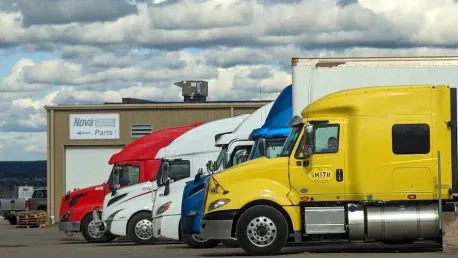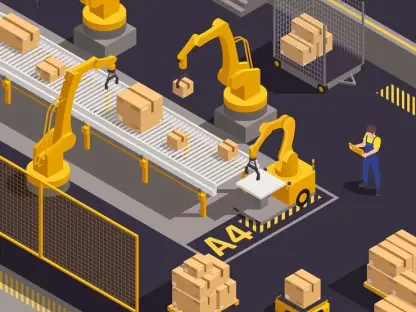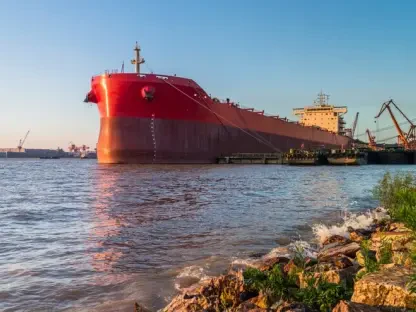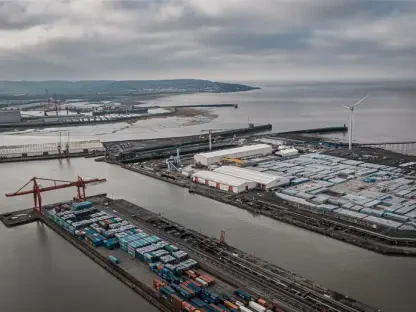Fleet management has seen remarkable transformations over recent years. With continuous advancements in technology and heightened focus on efficiency, safety, and sustainability, the fleet management sector is experiencing a new wave of innovations and trends that are reshaping its landscape. From prestigious awards recognizing industry excellence to the latest technological and infrastructural advancements, these changes showcase how the industry is evolving to meet modern demands. Companies are increasingly leveraging innovative technologies, investing in safety, and cultivating future leaders to navigate the complexities of today’s logistics environment.
Technological innovations and process improvements are central to this evolution, emphasizing the importance of automation, data-driven decision-making, and proactive maintenance. These advancements illustrate a broader industry trend towards enhanced operational efficiency and infrastructure investment. Economic challenges and leadership developments are also pivotal, highlighting the need for strategic planning and adaptive measures. As the industry adapts to these dynamics, it sets a groundwork for sustainable growth and resilience, reinforcing its critical role in the global supply chain.
South Coast Logistics’ Prestigious Awards
South Coast Logistics’ recent recognition as the “Irish Hauler of the Year 2025” and recipient of the “National Hauler” title signifies the company’s substantial progress and commitment to excellence. Their innovative inland port terminal at Ballycoolin, Dublin, has played a crucial role in achieving these accolades. The facility’s comprehensive service offerings have streamlined operations and expanded the company’s capabilities. Richie O’Flynn, South Coast’s commercial director, attributes this success to the dedication and vision of two generations of family ownership since 1975, emphasizing principles of innovation and exceptional service.
The accolades underscore South Coast Logistics’ strategic advancements in logistics management. The Ballycoolin terminal symbolizes their forward-thinking approach, merging traditional values with cutting-edge solutions. Earning these prestigious titles also signals their influential role in setting industry benchmarks for efficiency, service quality, and adaptability. This achievement not only highlights their operational excellence but also showcases the company’s potential for future industry leadership, acting as a catalyst for continued innovation in fleet management.
Technological Advancements
Tandem’s Bulk Liquid Distribution System
Tandem has introduced a novel bulk liquid distribution system designed to enhance efficiency and safety in bulk liquid transport. This advanced system aims to improve logistics by streamlining operations for companies involved in this specialized field. The move towards increased automation and technological integration in the fleet management industry is evident through such innovations. Efficiency and reliability are central to these advancements, aligning with the industry’s needs for enhanced operational capabilities.
The new system embodies a shift towards smarter fleet solutions that not only optimize transportation channels but also ensure robust safety standards. By integrating automated processes, Tandem’s initiative exemplifies how technology can address the complexities of bulk liquid logistics. These enhancements potentially minimize human error and bolster operational consistency, reflecting a deeper industry trajectory towards digitization and intelligent systems. As companies like Tandem continue to pioneer these technological frontiers, the collective benefit to fleet management is apparent—streamlined processes, heightened safety, and reduced operational downtime.
Volvo’s Enhanced Blue Service Contract Solutions
Volvo has updated its Blue Service Contract solutions, offering improved service and maintenance support for its customers. These enhancements focus on reducing downtime and boosting operational efficiency for fleet operators. The provision of proactive and comprehensive maintenance solutions reflects a broader industry trend towards mitigating risks and ensuring uninterrupted operations. Such updates underscore the shift towards more effective fleet management practices.
The enhanced services provided under the Blue Service Contract aim to anticipate and prevent issues before they become disruptions, showcasing Volvo’s commitment to customer-centric solutions. This approach highlights an industry-wide movement towards preventative maintenance as a standard practice, which not only extends the life of fleet vehicles but also ensures more predictable performance outcomes. These developments mark a significant evolution in service contracts, transforming them from reactive measures to proactive strategies that align with modern fleet management expectations of reliability and efficiency.
New Initiatives in Transloading
Heniff’s Transload Terminal
Heniff Transportation Systems has taken a significant step by managing a new $3 million transload terminal. This initiative demonstrates Heniff’s commitment to expanding its logistical capabilities and infrastructure. The new facility is expected to enhance capacity and efficiency in handling transload operations, which are essential for industries dependent on timely and efficient transport services. Investment in such infrastructures reflects the growing demands of modern logistics and supply chain management.
The new terminal represents a strategic enhancement to Heniff’s operational framework, enabling them to better meet the evolving requirements of their clients. By investing in advanced transloading infrastructure, Heniff underscores the importance of agility and scalability in logistics. This move also illustrates the sector’s focus on infrastructure as a key driver of operational success, reinforcing the notion that robust physical frameworks are critical in supporting efficient, reliable, and adaptable logistics operations.
Eco-Energy’s Transload Terminal
Eco-Energy, similarly, opened a new transload terminal, reinforcing its operational prowess in the transloading sector. This expansion is a testament to the emphasis on improving logistical frameworks to meet increasing market demands. Such initiatives highlight the critical role of infrastructural investment in supporting advanced logistics and efficient operations. As the logistics landscape becomes more complex, the ability to pivot swiftly and handle diverse logistical needs becomes a competitive advantage.
The new terminal bolsters Eco-Energy’s capacity to deliver streamlined transloading services, meeting the nuanced demands of modern supply chains. In doing so, Eco-Energy not only enhances its service portfolio but also sets a precedent for others in the sector. These infrastructure investments are not merely expansions; they represent a commitment to innovation and excellence in logistics, ensuring that companies can meet future challenges with resilience and efficiency.
Fleet Safety Enhancements
Plastic Express
Plastic Express has made notable strides in enhancing the safety of its fleet. Although specific details of these enhancements are not provided, the general move to improve fleet safety aligns with industry goals of minimizing risks, protecting assets, and ensuring the safety of drivers and cargo. Safety measures are integral to maintaining operational standards and safeguarding the workforce. This focus demonstrates a commitment to upholding safety alongside operational efficiency.
The steps taken by Plastic Express reflect a broader industry trend prioritizing safety as a fundamental component of fleet management. Enhanced safety protocols and technologies contribute to reducing incidents and insurance costs, fostering a safer working environment. By focusing on safety, companies safeguard their human and logistical capital, ensuring long-term viability and operational integrity. This trend emphasizes that effective fleet management is as much about safeguarding people and cargo as it is about optimizing routes and schedules.
Leadership and Training in Fleet Management
ATA’s 80th Chairman
The American Trucking Associations (ATA) has appointed Dellinger as its 80th chairman. This leadership change is significant as it often brings fresh perspectives and new directions for the organization. Steering ATA through current challenges and future opportunities in the trucking industry will be a key focus of this appointment. Leadership developments are pivotal in guiding the industry towards sustainable growth.
Dellinger’s new role comes at a crucial time, where strategic vision and innovative thinking are essential to navigate the industry’s evolving landscape. His leadership is expected to influence key policies and initiatives that bolster the trucking sector’s resilience and adaptability. The appointment symbolizes a commitment to continuous improvement and forward momentum within the ATA, ensuring that the association remains responsive to both immediate challenges and long-term industry trends.
LEAD ATA Class
ATA’s introduction of its 12th LEAD ATA class is another noteworthy initiative. This program is designed to cultivate future leaders within the trucking industry, ensuring that there is a steady stream of skilled professionals ready to tackle emerging challenges. Sustainable leadership development is crucial for the industry’s resilience and ability to adapt to evolving demands. The LEAD ATA program highlights a proactive approach to nurturing talent and ensuring industry continuity.
By fostering leadership skills and industry knowledge, the program prepares participants for roles that shape the future of trucking. This initiative underscores the ATA’s commitment to professional development and strategic foresight. The continuous cycle of training and education provided by LEAD ATA acts as a cornerstone for building a knowledgeable and capable workforce, ready to innovate and drive the industry forward amidst shifting market dynamics and technological advancements.
Economic Concerns and Industry Insights
As the trucking industry braces for 2025, economic challenges remain at the forefront. Discussed by industry expert Josh Fisher, these concerns include operational costs, regulatory pressures, and dynamic market conditions. The economic climate significantly impacts the industry, necessitating strategic planning and adaptive measures from stakeholders. Addressing these challenges head-on is essential for maintaining stability and fostering growth. The complex interplay between these factors requires astute management and agile responses to ensure continued operational success.
The importance of economic insights cannot be overstated, as they inform decision-making processes that affect everything from pricing strategies to fleet investments. Stakeholders must remain vigilant and flexible, incorporating economic trends into their strategic outlook. This approach helps mitigate risks associated with economic volatility, enabling companies to navigate through uncertainties and capitalize on emerging opportunities. The trucking industry’s resilience depends on its ability to adapt to economic shifts while maintaining operational efficiency and service quality.
Technological Innovations in Trailer Insights
New partnerships in the fleet management sector have led to advancements in trailer technology, unlocking actionable insights into trailer operations. These developments suggest a shift towards data-driven decision-making, enabling companies to optimize performance through enhanced understanding of operational efficiencies, maintenance needs, and overall fleet performance. Embracing these technological advancements is indicative of the industry’s move towards greater precision and transparency.
The integration of advanced monitoring and diagnostic tools into trailer technology allows for real-time data collection and analysis. This capability transforms how companies manage their trailers, from maintenance schedules to load optimization. By leveraging these insights, fleet operators can enhance their decision-making processes, leading to more efficient and cost-effective operations. This technological evolution marks a significant step forward in fleet management, underscoring the importance of innovation in achieving operational excellence and long-term sustainability.
Conclusion
Fleet management has undergone significant changes recently. Continuous technological advancements and a stronger focus on efficiency, safety, and sustainability are driving new innovations and trends within the industry. These changes are evident through prestigious awards, technological advancements, and infrastructural improvements, all highlighting how the sector is evolving to meet modern demands. Companies now leverage cutting-edge technologies, invest in safety measures, and develop future leaders to handle today’s complex logistics environment.
Central to this transformation are technological innovations and process improvements. Automation, data-driven decision-making, and proactive maintenance are becoming vital, underscoring a broader trend toward operational efficiency and infrastructure investment. Economic challenges and the emergence of new leadership also play critical roles, emphasizing the need for strategic planning and adaptability. As the industry continues to adjust to these shifting dynamics, it lays the foundation for sustainable growth and resilience, thereby reinforcing its essential role in the global supply chain.









